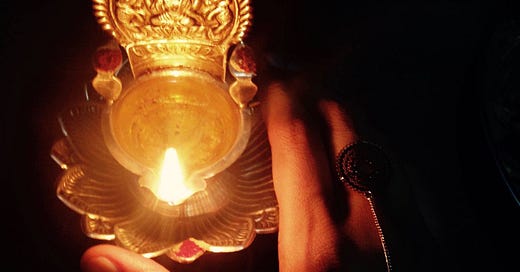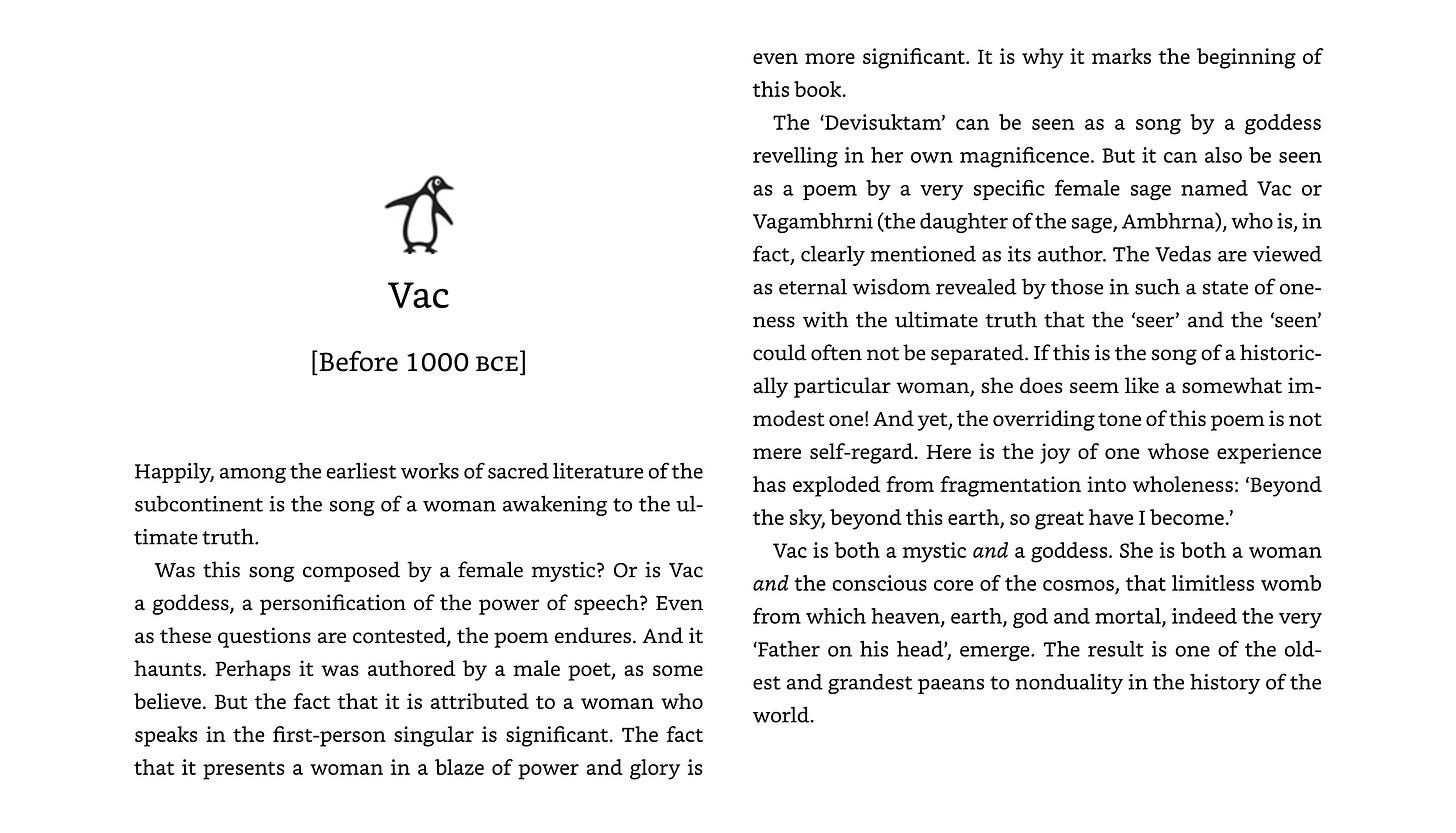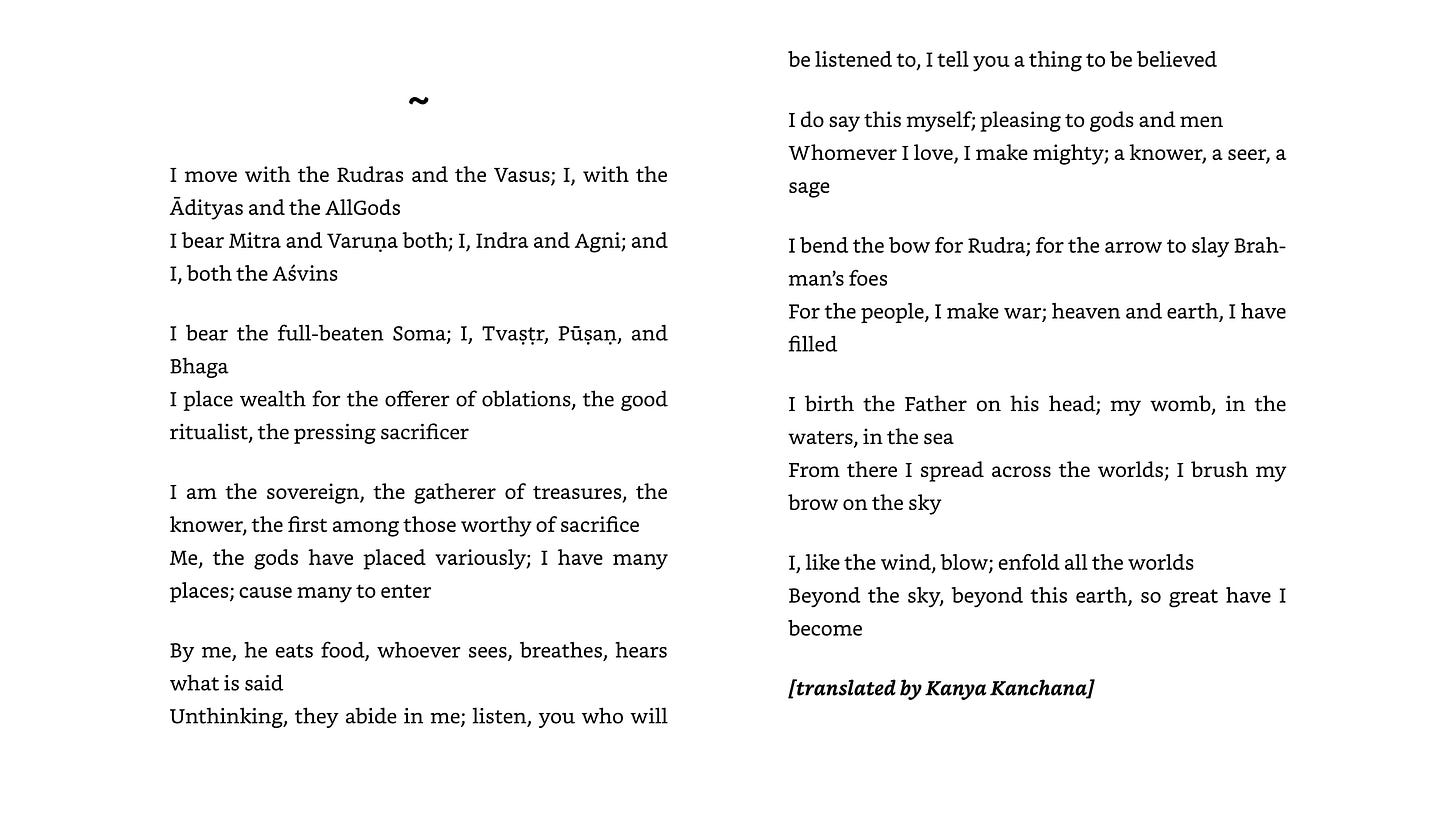4000 years ago in Mesopotamia, in the Sumerian city-state of Ur, there lived Enheduana—princess, high priestess, and poet—the first named author in literary history. Her hymns to the goddess Inana are the earliest poems we know of.
Around 3500 years ago in India, we find another named author—वाच् Vāc. Daughter of the sage Ambhṛṇa, she was a seer and poet. Vāc wrote a hymn to/about the Vedic goddess of the word, also known as Vāc. Here’s the curious thing. In the hymn, we can’t tell them apart.
वागाम्भृणीसूक्त Vāgāmbhṛṇīsūkta1, ऋग्वेद Ṛgveda 10.10.125, is a stunning hymn. Here’s my small attempt at a contemporary poetic translation—Hymn to Vāc—published as the anthology opener in Wild Women: Seekers, Protagonists and Goddesses in Sacred Indian Poetry, edited by Arundhathi Subramaniam, Penguin Random House India, 2024. Any errors are my own.
My thanks to Arundhathi for opening with this piece and for her loving and generous introduction to the hymn.
She says, “If this is the song of a historically particular woman, she does seem like a somewhat immodest one!” Such a disclaimer may not be necessary, after all, given the rest. Contemporary society defaults the ‘I’ to the ego. But when the ‘seer’ and the ‘seen’ are one, the ‘I’ refers to the real self. No space for false modesty remains. When you’ve become all that is, how else could you speak?
Please note that these are screenshots from the ebook and the format forces linebreaks. For those curious, I’ve given the original text in a footnote2.
Image: I’m holding a traditional South Indian sesame oil lamp called (Gaja) Lakshmi Vilakku. It shows the goddess लक्ष्मी Lakṣmī flanked by flower-showering elephants and protected by a dragonesque chimera called யாழி yāḻī. The red marks are from Madurai குங்குமம் kuṅkumam, an intoxicatingly fragrant sacred powder made from turmeric, slaked lime, and தாழை tāḻai flowers (Pandanus odorifer/fascicularis). Photo © Kanya Kanchana
Marginalia: Turmeric contains yellow curcumin, an indicator that works sort of like litmus paper. Slaked lime is calcium hydroxide, a base with pH > 7, and it turns the yellow red. Southeast Asia knows the pandanus or screw pine for its flavourful leaves used in cooking. Pandan kaya used as a toast spread is a particularly good example, provided eggs are used with restraint.
#light #sound #word #offering #sacredpoetry
Also known as देवीसूक्त Devīsūkta
Here’s the original text in Devanāgarī script with Vedic accents (chant marks) as well as the transliteration/romanisation in IAST.
अ॒हं रु॒द्रेभि॒र्वसु॑भिश्चराम्य॒हमा᳚दि॒त्यैरु॒त वि॒श्वदे᳚वैः ।
अ॒हं मि॒त्रावरु॑णो॒भा बि॑भर्म्य॒हमि᳚न्द्रा॒ग्नी अ॒हम॒श्विनो॒भा ॥ १ ॥
ahaṃ rudrebhirvasubhiścarāmi ahamādityairuta viśvadevaiḥ
ahaṃ mitrāvaruṇobhā bibharmi ahamindrāgnī ahamaśvinobhā
अ॒हं सोम॑माह॒नसं᳚ बिभर्म्य॒हं त्वष्टा᳚रमु॒त पू॒षणं॒ भगम्᳚ ।
अ॒हं द॑धामि॒ द्रवि॑णं ह॒विष्म॑ते सुप्रा॒व्ये॒ ए॒ ३॒॑ यज॑मानाय सुन्व॒ते ॥ २ ॥
ahaṃ somamāhanasaṃ bibharmi ahaṃ tvaṣṭāramuta pūṣaṇaṃ bhagam
ahaṃ dadhāmi draviṇaṃ haviṣmate suprāvye yajamānāya sunvate
अ॒हं राष्ट्री᳚ स॒ङ्गम॑नी॒ वसू᳚नां चिकि॒तुषी᳚ प्रथ॒मा य॒ज्ञिया᳚नाम् ।
तां मा᳚ दे॒वा व्य॑दधुः पुरु॒त्रा भूरि॑स्थात्रां॒ भूर्या᳚ वे॒शयन्᳚तीम् ॥ ३ ॥
ahaṃ rāṣṭrī saṅgamanī vasūnāṃ cikituṣī prathamā yajñiyānām
tāṃ mā devā vyadadhuḥ purutrā bhūristhātrāṃ bhūryā veśayantīm
मया॒ सोऽअन्न॑मत्ति॒ यो वि॒पश्य॑ति॒ यः प्राणि॑ति॒ य ईं᳚ श्रृ॒णोत्यु॒क्तम् ।
अ॒म॒न्तवो॒मान्त उप॑क्षियन्ति श्रु॒धिश्रु॑त श्रद्धि॒वं ते᳚ वदामि ॥ ४ ॥
mayā so annamatti yo vipaśyati yaḥ prāṇiti ya īṃ śṛṇotyuktam
amantavomānta upakṣiyanti śrudhiśruta śraddhivaṃ te vadāmi
अ॒हमे॒व स्व॒यमि॒दं व॑दामि॒ जुष्टं᳚ दे॒वेभि॑रु॒त मानु॑षेभिः ।
यं का॒मये॒ तं त॑मु॒ग्रं कृ॑णोमि॒ तं ब्र॒ह्माणं॒ तमृषिं॒ तं सु॑मे॒धाम् ॥ ५ ॥
ahameva svayamidaṃ vadāmi juṣṭaṃ devebhiruta mānuṣebhiḥ
yaṃ kāmaye taṃ tamugraṃ kṛṇomi tam brahmāṇaṃ tam ṛṣiṃ taṃ sumedhām
अ॒हं रु॒द्राय॒ धनु॒रात॑नोमि ब्रह्म॒द्विषे॒ शर॑वे॒हन्त॒ वा उ॑ ।
अ॒हं जना᳚य स॒मदं᳚ कृणोम्य॒हं द्यावा᳚पृथि॒वी आवि॑वेश ॥ ६ ॥
ahaṃ rudrāya dhanurātanomi brahmadviṣe śaravehanta vā u
ahaṃ janāya samadaṃ kṛṇomi ahaṃ dyāvāpṛthivī āviveśa
अ॒हं सु॑वे पि॒तर॑मस्य मू॒र्धन् मम॒ योनि॑र॒प्स्व (अ॒)१॒॑न्तः स॑मु॒द्रे ।
ततो॒ विति॑ष्ठे॒ भुव॒नानु॒ विश्वो॒ तामूं द्यां व॒र्ष्मणोप॑स्पृशामि ॥ ७ ॥
ahaṃ suve pitaramasya mūrdhan mama yonirapsva antaḥ samudre
tato vitiṣṭhe bhuvanānu viśvo tāmūṃ dyāṃ varṣmaṇopaspṛśāmi
अ॒हमे॒व वात॑ऽइव॒ प्रवा᳚म्या॒रभ॑माणा॒ भुव॑नानि॒ विश्वा᳚ ।
प॒रो दि॒वा प॒र ए॒ना पृ॑थि॒व्यै ताव॑ती महि॒ना सम्ब॑भूव ॥ ८ ॥
ahameva vāta iva pravāmyārabhamāṇā bhuvanāni viśvā
paro divā para enā pṛthivyai tāvatī mahinā saṃbabhūva






